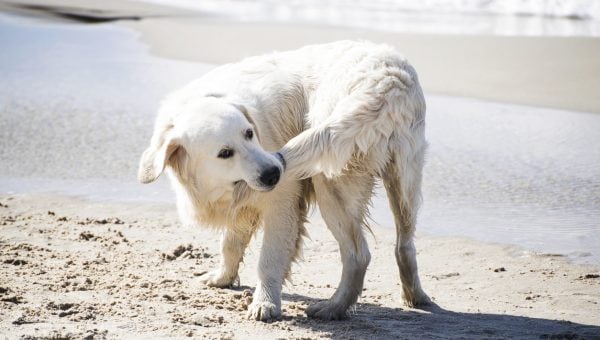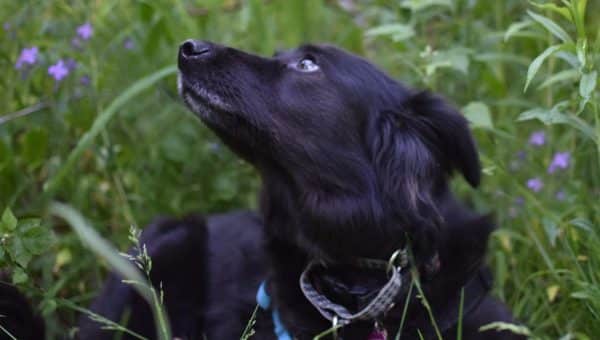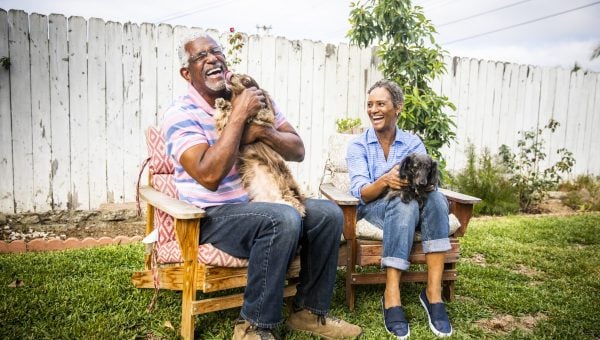Bonfire Night. Diwali. New Year’s Eve. These celebratory events all have loud noises in common—and unfortunately, most dogs do not like loud noises.
Research shows at least 40% of dogs have noise-related phobias. This definitely includes fireworks, which trigger a stress response that affects your dog’s overall health. Depending on how close you are, fireworks can also physically hurt your dog’s hearing as they ring in at 190 decibels.
But every dog also reacts to fireworks differently. You can have one dog who sleeps through fireworks without a second thought and one who panics at the first ‘pop’. This has a lot to do with nature and nurture.
Understanding why your dog is scared of fireworks can go a long way to formulating a plan before fireworks go off.
To help demystify firework anxiety and set your dog up for success, we interviewed experts and dove into dog behavioural research for tips on calming your pet during displays.
Symptoms of Firework Anxiety in Dogs
And if you ask pet owners, a report from The Kennel Club in the United Kingdom showed in a report that a whopping 80% of canines show anxious behaviour when fireworks light up the sky.
If your dog is scared of fireworks, you likely have witnessed the following anxious behaviours:
- A sudden alertness
- Flattening their ears
- Refusing to go outside or attempting to escape the house
- Restlessness
- Shaking or trembling
- Panting
- Excessive vocalising (whining, barking, etc.)
- Hiding
- Becoming extra clingy
From flashes to booming sounds, the startling nature of fireworks triggers the ‘flight or fright or freeze’ effect in dogs. This causes dogs to perceive fireworks as a threat or potential harm, which then manifests into dramatic fear and panic.
“Firework anxiety is a genuine phobia,” says Karishma Warr, MA, CCPDT-KA, FFCP, CSAT. Warr is the co-founder and head of training and behaviour at Calm Canine Academy. “When a dog is scared of fireworks it’s a panic disorder, and it’s vital that you treat it as such.”
10 Ways to Calm Your Dog During Fireworks
From things to give your dog as a distraction to remedies that help them relax, here are ways to make sure your dog feels comfortable and safe during active fireworks:
- Medications. Every expert we spoke to agreed: talking with a veterinarian about anti-anxiety medication is a good idea. A recent study found that 69% of owners said medications helped their dogs with firework anxiety.
- Pheromones. Dog-appeasing pheromone (DAP, or Adaptil®) mimics the pheromones produced by a mother dog, creating a sense of well-being in dogs. It’s available as a room diffuser, spray, or collar and can help your dog’s firework anxiety.
- Distraction with high-value treats. Remember those ‘self-soothe’ techniques? Ryan says to use goodies they love and put them in puzzle toys to encourage your dog to focus on something other than the noise outside.
- Let your dog ‘run it out’. A tired, sleepy dog doesn’t have the energy to pace or pant through the house. On days of scheduled fireworks, take your dog to the park for some high-energy, enrichment activities. Or out for a jog. But make sure you’re back before the festivities start!
- Give your dog lots of comfort and attention. Old behavioural theories recommended avoiding snuggles. But Warr says it’s up to the dog; if you have a pup looking for reassurance, there’s nothing wrong with quietly soothing them with some cuddles.
- Put on a pressure wrap or vest. The ThunderShirt behaves similarly to a ‘hug’ machine, applying even pressure across the torso. Reviews show it may or may not work in the moment when your dog is panicking. But as Joe Ryan, PMCT-1, CPDT-KA, VSA-CDT, FFCP, admits, it’s a “can’t hurt, might help” option.
- Play white noise or music. The noise of fireworks prompts fear in dogs the most. If you can drown out those crashes and booms with a white noise machine or pleasing music, you can quickly reduce their stress levels.
- Allow your dog extra space or a hiding place. Many dogs look for somewhere out of sight and hearing of the fireworks. Dr Waite says: “Our greyhound, Staale, did not like fireworks, but he did okay if we hung out in the basement and if the basement windows were covered to avoid seeing flashes of light.”
- Pair your dog with a dog who isn’t afraid of fireworks. Remember that modelling behaviour? It can work in reverse, too. If your nervous dog sees an older or more dominant dog relaxing and remaining calm during the fireworks display, it can set a precedent.
- Stay calm yourself. “Be the executive, but stay calm yourself,” reminds Warr. Dogs sense even the tiniest changes, down to our body temperatures. If you feel nervous or edgy, your dog may also interpret fireworks as the problem. So take some deep breaths and remain calm.
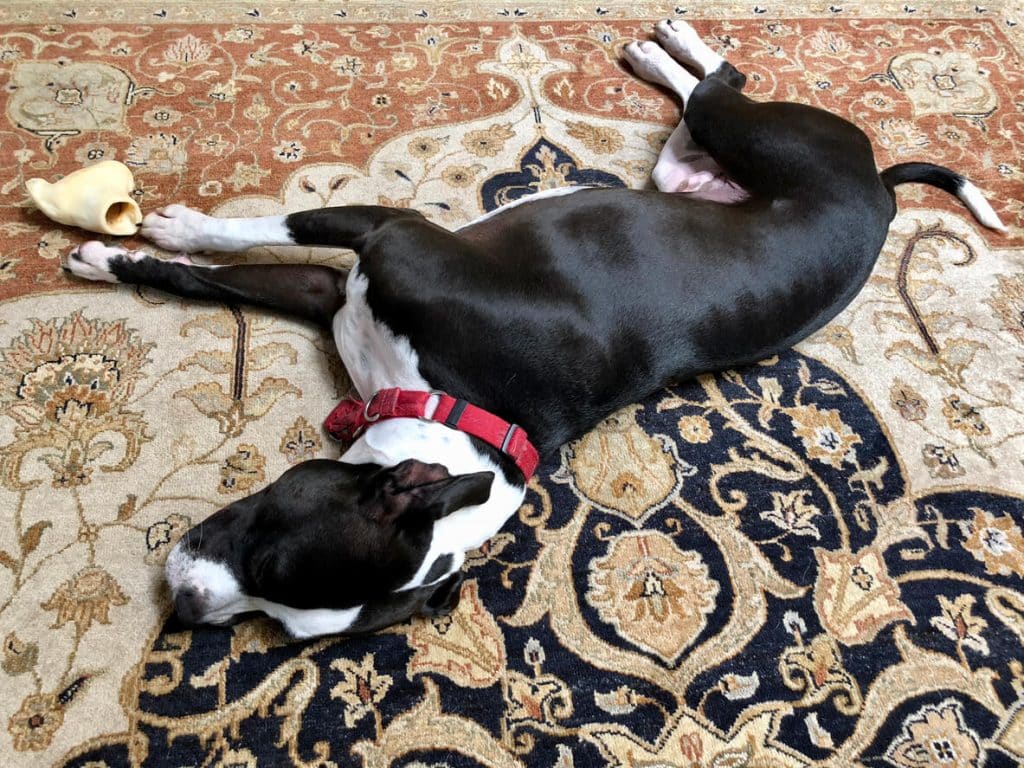
iStock/Campwillowlake
And don’t forget that it can take eight to 12 hours for the stress of the firework anxiety to dissipate! This is why Warr recommends avoiding going out for the remainder of the night. You never know when a stray ‘bang’ may retrigger that fear and send your dog back into a panic.
Instead, focus on those self-soothing activities. Ryan, who is the general manager of enrichment and training at Patrick’s Pet Care and has also placed sixth in Sniffspots 2022 Best Dog Trainers Competition, suggests snuffle or lick mats, frozen Kong toys, or even piles of egg cartons or paper towel rolls for your dog to explore and shred.
The best way to tackle firework anxiety is to plan ahead
“You can’t reinforce their fear,” Warr says firmly. This means your dog isn’t going to get more anxious or scared because you’re trying to soothe them. This reality means it’s your responsibility to be proactive. If you wait until after the fireworks have started to act on your dog’s anxiety, it’s too late.
“Once a dog becomes frightened and anxious, the body’s psychological stress processes will be well underway and much more difficult to contain,” says Jamie Whittenburg, DVM, is the director of the Kingsgate Animal Hospital in Lubbock, Texas, and a veterinary director at Senior Tail Waggers. “It is always prudent to be prepared and proactive in dealing with a dog’s anxiety.”
If your dog is already panicking, focus on safety. Warr recommends keeping a double lead on your dog and staying within easy reach. The leashes ensure they will remain safe throughout the fireworks display and that you won’t lose track of them, especially if you decide to take them outdoors.
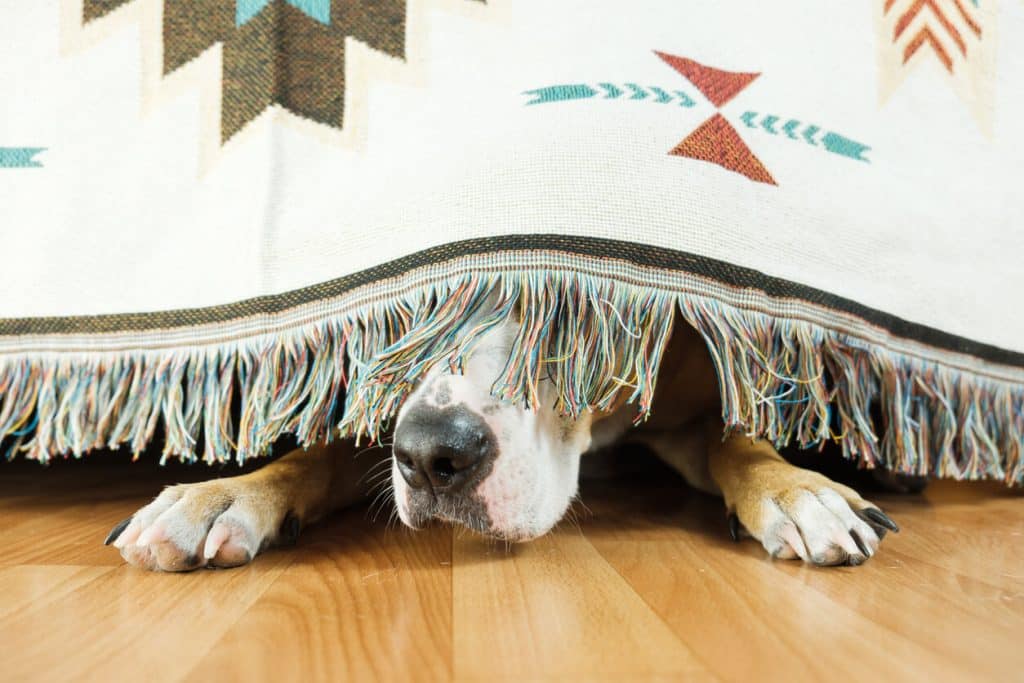
iStock/Photoboyko
Reasons Dogs are Afraid of Fireworks
Here are five reasons dogs find these sky displays unnerving and tips on how to help them relax during firework season.
Fireworks generate a sense of threat
Fireworks have a sharp, abrupt ‘pop’ that doesn’t resemble a natural sound. “Dogs don’t understand fireworks, and the flashing colourful lights and huge booming sounds are scary,” says Dr Whittenburg.
Whittenburg has seen plenty of panicked pups in her time. “They don’t know where the sounds and lights are coming from, and they have no way to escape. Dogs can’t understand if these things are threatening their safety.”
Pro-tip: Let your dog self-soothe after the fireworks are over, advises Warr. Calming them during fireworks can be tricky (we covered those calming tips above).
“Focus on licking, chewing, or sniffing activities that are natural behaviours,” says Warr. Anything that will engage your dog for 15-20 minutes. She suggests offering a treat-filled toy or hiding small treats around the house.
Lack of early exposure
Puppies need exposure to new sounds and experiences to promote confidence and healthy development. That slow, early exposure—before 12 weeks of age—is critical and must be positive to ensure your dog isn’t frightened when they’re older.
Pro-tip: Try Victoria Stillwell’s noise phobia series for your puppy, says Ryan.
“They start with [firework] noises at a very low level, and there’s nice calm music over it. You play it while they’re eating or enjoying a chew or something. And the more tracks you go through, the louder the noise gets, and the quieter the music gets.”
Caution: If you overexpose your dog, they may remain scared of fireworks.
Previous traumatic experiences around loud noises
Much like you avoid putting your hand on a hot stove, your dog flees from the sound of fireworks. If your dog experienced an injury or reprimand while hearing an innocent ‘popping’ sound on television, it could turn into a fear of fireworks.
“Traumatic early experiences may increase an animal’s fear response, which increases their desire to avoid or escape these situations,” says Mindy Waite, Ph.D., CAAB, CPDT-KA. Dr Waite is a certified dog behaviourist at Senior Tail Waggers, and she’s conducted plenty of research on dog behaviour at the University of Wisconsin.
Pro-tip: When confronting a previous trauma, Ryan says it’s time to find a reputable professional veterinary behaviourist. They’ll be able to prescribe anti-anxiety medications and help you work through the fear-related behaviours.
Learned behaviours from other dogs
Also known as modelling, this is where dogs mimic the behaviour of one another through social learning. Warr mentions, if you have an older dog and a younger dog, or multiple dogs where one is higher in social standing than the others, you may witness modelling behaviour in the group.
Unfortunately, this can lead to everyone panicking during fireworks, whether or not they’re afraid.
Pro-tip: “Help both dogs feel as safe as possible,” Ryan suggests. You can later work on desensitisation exercises with the dog with greater anxiety.
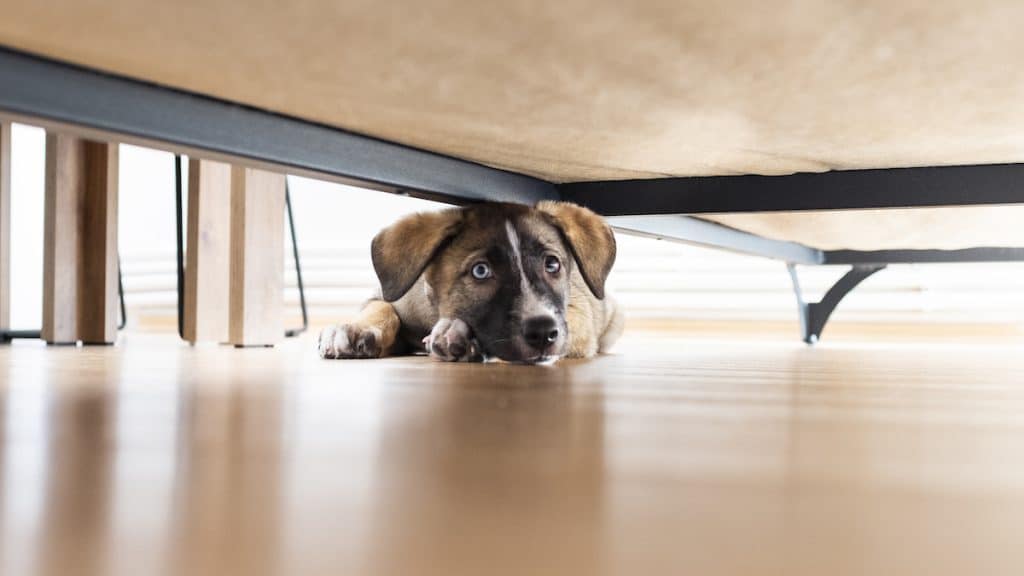
iStock/mehmetugurozer
Breed, genetics, and hormones play a role
A 2020 study on genetics and canine sensitivity examined how different breeds responded to loud noises and heights. They found that herding breeds showed the highest chance of demonstrating a fear of fireworks. That lack of a ‘killer instinct’ was the crucial link as there was is a genetic basis for the panic. Dogs bred to herd animals, but not to harm or kill them.
On the flip side, hunting and working breeds were bred to function around sharp, punctuated noises and weren’t as likely to respond to fireworks. Their genetic code taught them that the sounds weren’t dangerous, so they ignored them.
Here is a list of breeds noted to be more or less scared of fireworks:
| Dogs more scared of fireworks | Dogs less scared of fireworks |
| Cairn Terrier | Labrador Retriever |
| Pembroke Welsh Corgi | German Shepherd |
| Lagotto Romagnolo | Miniature Poodle |
| Rough Collie | Chinese Crested |
How to Desensitise Dogs to Firework Sounds
Calming a dog’s anxiety in the moment may or may not succeed. This is why firework desensitisation is the go-to method for helping your dog with their noise phobia. Mainly because if a dog is afraid of one loud noise (like fireworks), the odds are high they’re afraid of other sounds.
Pair ‘pops’ with fun
At Calm Canine Academy, Warr says they use a “safe stimulus” when they begin training. “We pair the single ‘pop’ sound with a game or treat.” They then use a Bluetooth speaker to play the sound indoors and outdoors, splitting up how often they introduce that stimulus over time. “It isn’t training so much as therapy,” she says.
And, of course, they don’t start a program until after the pet parent speaks with a veterinarian.
Train for months
The training process can reasonably take up to six months, possibly longer if the dog experienced severe trauma concerning their anxiety. Warr likes to remind pet parents they’re working on a physiological panic response. And all that desensitisation takes time.
(Remember, dogs who are afraid of fireworks have a genuine phobia!)
“People see behaviour shows on TV that demonstrate ‘cured’ behaviour in 20 minutes. But they don’t realise that those dogs are still panicking internally,” she points out.
Intervene with medication
“The earlier you can intervene with training and medications, the more likely you are to be able to avoid the worsening of the behaviour,” says Waite. “The most important thing a dog owner can do is get help from a professional, even when noticing minor behavioural changes.”
The last thing you want is an ongoing stress response in your dog.
“Typically, we see this as a result of an endocrine disease, such as Cushing’s (hyperadrenocorticism), but it is possible that severe long-term stress could also have negative health impacts,” cautions Dr Whittenburg.
How to Prevent Escapes During Fireworks
Firework Night represents the worst day for lost pets as dogs attempt to escape frightening sounds. And those panicked flights are dangerous. As Dr Waite says: “Many dogs will not stop running during fireworks until they are completely exhausted, injured, or killed. Not only is escape during fireworks deadly, but being outside could make future fear responses even worse.”
This is why heading out of town on those firework-heavy holidays is one of Ryan’s biggest recommendations: “Go somewhere that you know is going to be quiet.”
Other prevention tips include:
- Not leaving your dog home alone! If you decide to watch the fireworks, try to arrange for a dog sitter. And make sure they’re aware of all the firework calming tips for dogs. You don’t want to come home and find you’re pup has fled!
- Keeping them inside. Even if your dog is used to being outside, they should come inside. “Panicked dogs will clear fences they wouldn’t normally try to jump,” warns Dr Waite.
- Use a double leash, if outside. If you must take them out during the display for any reason, put them on a double lead. You might lose one leash, but you won’t drop them both.
- Double check your doors and windows. “Remain vigilante, especially if you choose to go out at night,” Warr says. “Be the executive of the house and ensure everyone’s safety.”
- Always ensure your dog has a registered microchip and an ID tag on their collar or harness, just in case they get away from you.
Fill in your family and friends for what to do if you let them know that your dog is missing as well. For example, your search team will need to know if your lost dog has reliable recall or needs to be approached slowly.
The Bottom Line
The best ways to calm your dog down during fireworks are to provide them with a safe space indoors with calm distractions from the noise. You can set up hiding places away from windows and doors, with white noise or music to disguise the sounds.
Cuddles, doggy massages, and reassuring words are recommended—for you and your pup. You also have the option of canine pheromones or pressure vests.
And when the noise finally settles down, you can encourage your dog to self-soothe to bring those cortisol levels down. Offer treat-filled puzzle toys. Or set up a scavenger hunt through the house to engage their nose. Encourage them to use their senses for at least 15 minutes to help them settle.
Experts strongly recommend that you speak with a veterinarian about your dog’s firework phobia as soon as you notice changes in their behaviour. Because it can take months to desensitise your dog to the sounds, you should act now.
If you’re reading this in anticipation of fireworks, pet gates may also be a worthwhile investment!
And you can always keep these tips handy for those unexpected fireworks. So you and your dog remain calm, relaxed, and collected. Even if you’re hanging out in the basement or bathroom.


